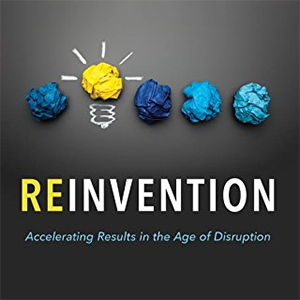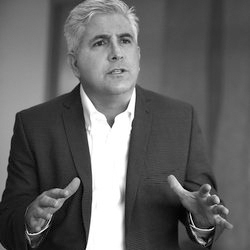
Mindsets Matter!
By Shane Cragun & Kate Sweetman
Did you know that the behaviors you exhibit on a daily basis are the manifestation of the way you see the world?
Everyone has what we call “worldviews.” Worldviews are the natural filters that are ingrained in us that cause us to perceive things the way we do. Our background and experiences—from how we were parented, where we were raised in the world, religion, education level, and significant emotional experiences—have shaped our mindsets and how we see the world.
Let’s look at a business example of how mindsets matter, and how they can affect performance outcomes in substantial ways.
Steve Ballmer took over the reigns from Bill Gates in 2002 as the CEO of Microsoft. What was his worldview? He felt Microsoft should stick to its knitting, and stay with what worked in the past. Instead of investing in new technologies, he poured most investment into improving operating platforms (Vista) and software. He felt Microsoft operated best as an island and shunned offers to partner with others. Microsoft shares fell from around $60/share in 2002 to $30/share when he resigned in 2014.
His successor, Satya Nadella, sees the world very different. His mindset is to invest into new growth technologies such as cloud computing, and to establish partnerships with competitors in order to open up new markets. He sees the world as interconnected. Stock is at $64/share as of this writing, and there is a renewed sense of excitement at Microsoft. They seem relevant again.
It is important to respect all mindsets. But it is true that some mindsets tend to create better results in today’s Age of Disruption.
What happens when leaders, teams, and organizations (even societies) operate with distorted and outdated mindsets? Nothing good. Research shows that both tangibles (financials) and intangibles (morale) drop. Competing in the 21st century business ecosystem with faulty mindsets is a path to irrelevance and failure.
We’ve identified five thinking distortions that many of us fall victim to. As you read through this list, evaluate whether you, your team, or your peers battle with these:
- Distorted Mindset 1: What got us here will get us there. “Sticking to our knitting has worked well in the past. We’ve been around forever, and there is a certain way we do things. There is no need to do things differently.”
- Distorted Mindset 2: We know all there is to know. “I’ve gone from the shop floor to my current executive position. I’ve seen everything there is to see, believe me!”
- Distorted Mindset 3: Employees should feel lucky to have a job. “You mean Joe feels he should have a promotion and pay raise? I know he’s one of our best performers and a high potential, but he should feel lucky to simply have a job.
- Distorted Mindset 4: Our competitor’s success is pure luck. “There’s no way our top competitor can continue their lucky streak. And, make no mistake, their success is luck. They were at the right place at the right time.”
- Distorted Mindset 5: We know what’s best for our customers and stakeholders. “It’s great to receive feedback from customers, suppliers, and partners. And we should listen. But we clearly have a better understanding of product possibilities than they do.”
All five mindsets have a few things in common: they are outdated, distorted, and misaligned to the realities of today’s Age of Disruption. They can be found at the individual, team, organization, and societal level. They can be found in family relationships and community governments. And they are agnostic in terms of global region or culture.
The good news is that we can shift our unhealthy mindsets to those that produce better outcomes. But the key is having an awareness of our flawed thinking. You can’t work on something that you are unaware of. Some of these distorted thinking patterns might be blind to us, but chances are, if you ask others that have worked with you for a while, they can give you a helpful reality check.
Stephen R. Covey once stated a powerful and true principle: if you want to help others change their behavior, you must help them see things differently and as they truly are. And the same goes for each of us.
Take time to evaluate current worldviews and mindsets that seem to be producing not only poor results, but positive results.
Become aware, because mindsets matter!
Shane Cragun and Kate Sweetman are Founding Principals at SweetmanCragun, the world’s foremost provider of leadership solutions specifically tailored for today’s Age of Disruption. They are co-authors of the book Reinvention: Accelerating Results in the Age of Disruption (www.sweetmancragun.com).
 Shane Cragun is a founding partner at SweetmanCragun, a global management consulting, training, and coaching firm. His passion is creating high performance excellence at the individual, team, organizational, and societal levels around the globe. Cragun has worked as an internal change agent within a Fortune 500 High Tech Firm, a line executive at FranklinCovey, and a global external management consultant. His projects have received prizes in the areas of leadership and change. He recently co-authored with Kate Sweetman, Reinvention:
Shane Cragun is a founding partner at SweetmanCragun, a global management consulting, training, and coaching firm. His passion is creating high performance excellence at the individual, team, organizational, and societal levels around the globe. Cragun has worked as an internal change agent within a Fortune 500 High Tech Firm, a line executive at FranklinCovey, and a global external management consultant. His projects have received prizes in the areas of leadership and change. He recently co-authored with Kate Sweetman, Reinvention:
Accelerating Results in the Age of Disruption, has presented a TEDx talk in Silicon Valley and has spoken at business conferences worldwide.
 Kate Sweetman is a founding partner at SweetmanCragun. Sweetman was listed as an Emerging Guru with Thinkers50, and is co-author of the bestselling business book, The Leadership Code published by Harvard Business Press, as well as Reinvention: Accelerating Results in the Age of Disruption with Shane Cragun. Her first-hand experience with world leaders, Fortune 100 organizations, and Asian multi-nationals provides a substantial foundation for insights that extend beyond borders. A former editor at Harvard Business Review, she has been published in HBR, Sloan Management Review, Boston Globe, and the Times of India, and has appeared on CNBC in the U.S. and India. She is also a coach and visiting lecturer at MIT’s Legatum Center for Entrepreneurship.
Kate Sweetman is a founding partner at SweetmanCragun. Sweetman was listed as an Emerging Guru with Thinkers50, and is co-author of the bestselling business book, The Leadership Code published by Harvard Business Press, as well as Reinvention: Accelerating Results in the Age of Disruption with Shane Cragun. Her first-hand experience with world leaders, Fortune 100 organizations, and Asian multi-nationals provides a substantial foundation for insights that extend beyond borders. A former editor at Harvard Business Review, she has been published in HBR, Sloan Management Review, Boston Globe, and the Times of India, and has appeared on CNBC in the U.S. and India. She is also a coach and visiting lecturer at MIT’s Legatum Center for Entrepreneurship.


